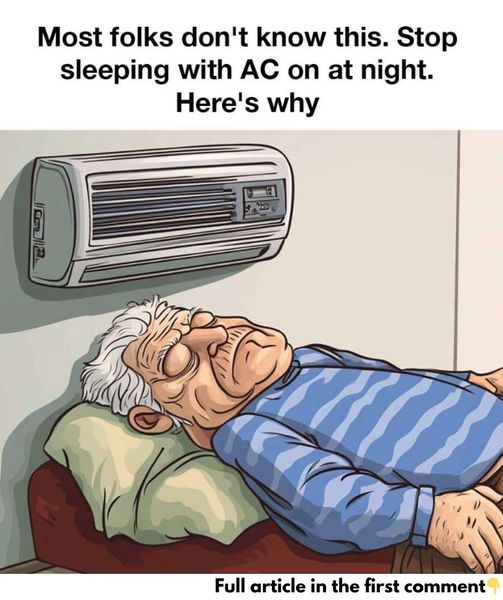In many homes, especially during the hot summer months, air conditioning (AC) is essential for staying cool at night. While the immediate relief from the heat may feel great, it’s important to consider the long-term impact of using AC every night. This article looks at how sleeping with the AC on can affect your health, wallet, and the environment—and offers smarter ways to stay cool at night.

1. Health Concerns
Sleeping with the AC on can cause a range of health issues that you might not even realize are related to your cooling habits.
a. Dry Skin and Dehydration
AC units reduce humidity in the air, which can lead to dry skin, eyes, and throat. If you’ve ever woken up feeling parched or with irritated skin, your AC might be the culprit. Over time, this dryness can contribute to dehydration or even respiratory problems.
b. Respiratory Issues
The cold, dry air from AC units can cause congestion, making it difficult to breathe, especially for people with asthma or allergies. In some cases, sleeping in an air-conditioned room can worsen symptoms like nighttime coughing or wheezing.
c. Increased Risk of Infections
If AC units aren’t properly cleaned and maintained, they can harbor mold, mildew, and bacteria. These harmful particles can circulate in the air, increasing your risk of respiratory infections, particularly when your immune system is vulnerable during sleep.
d. Muscle Stiffness and Aches
Waking up with a sore neck or stiff muscles? The cold air from the AC can cause muscles to contract, leading to discomfort. This can worsen conditions like arthritis, especially if you’re sleeping in an awkward position.
2. Disrupted Sleep Patterns
Our bodies naturally experience slight temperature changes throughout the night as part of the circadian rhythm. However, keeping your AC on at a low temperature can interfere with this process.
a. Reduced Deep Sleep
A cooler room can prevent your body from entering the deeper stages of sleep, which are essential for muscle repair, memory consolidation, and overall recovery. If your AC is set too cold, it may disrupt this restorative sleep phase, leaving you feeling groggy in the morning.
b. Frequent Waking
Setting the AC too low may cause you to wake up feeling cold or uncomfortable, leading to fragmented sleep. This disrupted rest can reduce sleep quality, making it harder to feel refreshed in the morning.
3. Environmental Impact
Running the AC all night affects more than just your health—it also has environmental consequences.
a. High Energy Usage
AC units consume a significant amount of electricity, particularly when they run continuously through the night. This not only drives up your utility bills but also contributes to higher energy demand, especially during summer months.
b. Greenhouse Gas Emissions
The more electricity we use, the more fossil fuels are burned to generate it, releasing greenhouse gases into the atmosphere. In addition, the refrigerants used in air conditioners are potent greenhouse gases, which can contribute to global warming if not properly managed.
4. Financial Costs
Using your AC every night can significantly increase your electricity bills. Over time, this extra cost can add up, especially during the hottest months of the year. Reducing your reliance on AC at night can lead to noticeable savings.
5. Alternatives to AC for a Cooler Night’s Sleep
Instead of running your AC all night, consider these alternatives to stay cool:
a. Use Fans
Ceiling or oscillating fans use far less energy than AC units and can provide a gentle breeze to keep air circulating without drastically lowering the room’s temperature.
b. Cool Bedding
Switch to breathable, moisture-wicking sheets made from cotton or linen. These fabrics stay cooler and can help regulate your body temperature.
c. Proper Ventilation
Open windows during the cooler parts of the day or night to allow fresh air to circulate, reducing your need for artificial cooling.
d. Stay Hydrated
Drinking water throughout the day helps your body naturally regulate its temperature, keeping you cooler at night.
e. Take a Cool Shower Before Bed
A quick cool shower can lower your body temperature and help you feel more comfortable as you fall asleep.
f. Adjust Your AC Usage
If you must use AC, set it to a higher temperature, like 78°F (25.5°C), and use a timer to turn it off after a few hours.
6. Smarter AC Usage
If you’re not ready to give up the comfort of AC entirely, here are some tips to use it more wisely:
a. Programmable Thermostat
A programmable thermostat lets you cool your room before bed and then gradually raise the temperature throughout the night, saving energy without sacrificing comfort.
b. Regular Maintenance
Clean your AC unit regularly to prevent mold and bacteria buildup, ensuring you’re breathing clean air and helping your unit run more efficiently.
c. Combine Cooling Methods
Use a mix of fans, ventilation, and cooling bedding to reduce your reliance on AC, keeping your home cool while saving energy.
Conclusion
While sleeping with the AC on may feel comfortable in the moment, the potential health risks, environmental impact, and financial costs make it worth reconsidering. By trying alternative cooling methods and being mindful of how you use your AC, you can enjoy a cooler night’s sleep while protecting your health and the environment.





